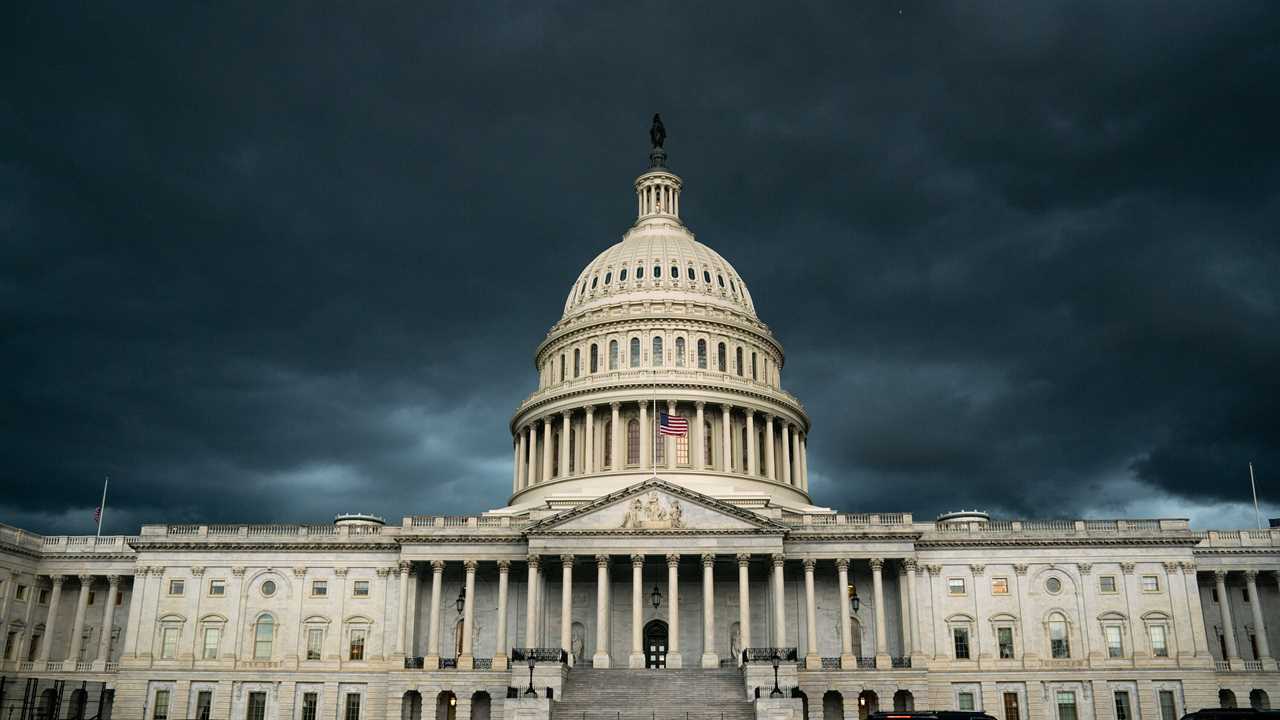
Tumbleweeds blew through the House chambers today, after Speaker Nancy Pelosi moved a major vote to Wednesday night, so that lawmakers could skip town a day early.
That’s because law enforcement officials had sounded the alarm that the Capitol might find itself under attack again, after today’s date, March 4, recently became a fixation among followers of the QAnon conspiracy theory.
When President Donald Trump left office in January, rather than staging a military coup, as many QAnon supporters had hoped he would, some adopted a hypothesis that Jan. 20 wasn’t the real Inauguration Day anyway — that it was, in fact, March 4, which really did serve as the presidential swearing-in date until the 1930s. That, they said, was when Trump would wrest back power from President Biden.
Of course, this — like QAnon’s fundamental beliefs that Democrats and coastal elites are involved in an international pedophilia ring, and that Trump is a God-sent savior who will rid the world of them — wasn’t actually true.
So as the date drew nearer, something ironic happened: Many of the online influencers who tend to drive the conversation around QAnon started throwing cold water on the March 4 idea, though it had been theirs in the first place.
“In the lead-up, all these influencers realized all these false prophecies are going to look bad and might hurt their profit,” Mia Bloom, the co-author of the forthcoming book “Pastels and Pedophiles: Inside the Mind of QAnon,” said in an interview.
Bloom, who is also a communications professor at Georgia State University, said that since December, when the original person (or people) who had been anonymously posting online under the name “Q” stopped writing publicly, a growing aristocracy of writers had sprung up to create paid content, using platforms like Patreon or PayPal to monetize their ever-evolving torrent of conspiracy narratives.
“They were the ones that floated March 4,” she said. “They were also the ones in the last two weeks saying: ‘No, no, no, it’s a false flag. It’s not QAnon that’s going to do anything on March 4. It’s a false-flag operation by antifa to make us look bad.’”
After the attacks of Jan. 6, commentators on the far right papered over the violence at the Capitol by saying that it had been a ploy, cooked up by left-wing activists and anarchists in antifa (itself an ideology, by the way, more than a real organization). And the lies have stuck: A poll last month from USA Today and Suffolk University found that nearly three-fifths of all Trump voters believed the Jan. 6 riot had been “mostly an antifa-inspired attack that only involved a few Trump supporters.”
This time around, seeing that it might not be wise to bring a group of fervid supporters to Washington for the arrival of a leader who doesn’t show up, QAnon influencers have gotten out in front of the problem — making a similar set of claims about antifa, butof time.
For Rachel Kleinfeld, a senior fellow in the Democracy, Conflict and Governance Program at the Carnegie Endowment for International Peace, this is just one more sign of how malleable — and potentially long-lasting — the QAnon conspiracy theory appears to be.
“What’s really worrisome about QAnon is that it’s basically a choose-your-own-adventure,” she said. “It allows people to co-create a conspiracy that gives them a strong sense of positive community and belonging, in a world that’s very isolated.”
“And it’s a community in which there’s an idea, rather like an improv group, to say, ‘Yes, and’ — not, ‘No, but,’” Kleinfeld said. “If someone throws out an idea, others are encouraged to build on it. That suggests a long life, a durability.”
Even as its original creator has seemingly stepped aside, QAnon’s supporters have become embedded within a range of far-right communities. That, Kleinfeld explained, is also making it stronger.
“A number of entities fuel QAnon,” she said. “There’s the moms’ anti-pedophilia groups, there’s the men-protecting-their-families groups, there’s the anti-vaxxers, the evangelicals. But they’re amplified by the officials who benefit from them. And the Republican Party has had a number of operatives that have benefited and therefore amplified Q.”
Did you miss our previous article...
https://trendinginthenews.com/usa-politics/elaine-chaos-mix-of-work-and-family-drew-early-ethics-scrutiny






